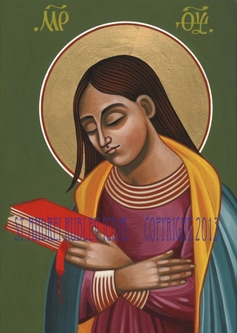 Sometimes the planning of an act is as important as carrying it out. I can remember years ago when I planned a surprise party for a friend. Half the fun was in the planning, conspiring with others, keeping her from finding out what we were planning, and then figuring out how we would get her to the party. It was fun to discover just how clever my friends and I could be in doing this without tipping her off that something was afoot. When we finally pulled it off, we were really happy that we were able to do this, because the surprise for our friend was real. It brought joy to plan and it brought joy to have the actual event take place. This is also true when we are discerning more serious action, such as a decision, an act of service, or a change we are working through interiorly. The praying, which includes allowing the Holy Spirit to reveal what needs to be done and then being responsive to the graces, is as fruitful as taking the appropriate action at the end of the process. We can learn as much about ourselves and about God during the time of reflection and prayer, that is, along the journey to our destination, as we do when we get where we are desire to go. I believe this was so for the Blessed Virgin Mary after the Annunciation as the words of the angel faded from her ears, but still rang out in her heart. Gabriel had just announced to her that the Most High God wished for her to be the mother of His Son, explaining how this would be so, and she had said the words that changed the course of salvation history: “I am the handmaid of the Lord. Be it done to me according to your word." St. Luke, the writer of the Annunciation account, does not tell us much about what went through Mary's mind except for one very important plan she made: she planned to leave as soon as she could for the hill country where her cousin Elizabeth lived. Elizabeth was miraculously 6 months pregnant, being in her old age. 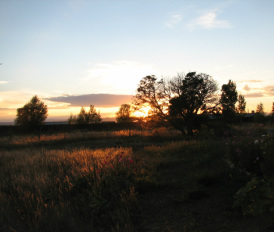 St. Luke indicates that Mary left posthaste for her cousin's house, and as I have reflected upon the Feast of the Visitation I was moved to reconsider the beginning of the passage: "During those days, Mary set out and traveled to the hill country in haste to a town of Judah, where she entered the house of Zechariah and greeted Elizabeth." (Luke 1:39-40) The phrase "during those days" indicates that Mary did not drop everything, pick up a donkey, and ride off into the sunrise to see her cousin. She would have had to consider how to get there, making travel arrangements for such a journey. There is a distance involved, and young women did not travel outside of their towns to other cities alone. Not only would that have been strange, but it would have been dangerous, since there may have been robbers on the roads, or there could have been the presence of wild animals, or even a few Roman soldiers. One did not travel alone, especially not a young (pregnant) woman. Therefore there had to be some time of planning. The passage does say she traveled in haste to the hill country. However, the issue is not necessarily how quickly she traveled, but that she wanted to be present for the birth of John the Baptizer who would be the relative and the forerunner of her Son. The urgency was to share her joy, and also that Mary wanted to serve her cousin, Elizabeth. She wanted to be true to the message of her unborn Son, which was to be the one who comes to serve. She would be attending both Elizabeth in childbirth and the son who was to be born, John the Baptizer. The amount of time is not at all important, except to indicate that Mary was very humble and that she has become the first disciple of her son, Jesus. Mary had to take the time to plan her trip, maybe unable to explain why she was going or how she knew she needed to go to visit Elizabeth. Mary was a woman of prayer. She was a woman who listened deeply to the Lord her God. So while the passage says she went in haste, it does not say she left hastily. She had the Son within her, having been overshadowed by the Spirit: she was full of grace. Therefore, she had to spend time praying about how God wanted her to accomplish the desire of her heart, which was to serve her Son by serving her cousin. Mary had to spend time listening to the song of love which already was within her heart and which she finally expressed after she saw Elizabeth. We know that song as the Magnificat. 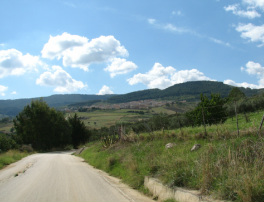 All authentic prayer leads us outward. Mary is an excellent teacher in this regard. She had to pray about the best path and what she would have to say and do to accomplish this journey: she would have had to tell her parents that she needed to go and why, she may even have had to tell Joseph, her betrothed, that she needed to make this trip. To do so she would have reflected not only upon how to plan the trip, but what was happening within her as well. She would have continually prayed about what the angel had said to her and how she trusted God so greatly that everything would be done as promised. She trusted when the angel said "Nothing will be impossible with God,” (Luke 1:37) but she still had to spend time praying about what that meant. Mary must have been filled with joy, wonder, awe, and praise. She was contemplating what it meant that she was filled with the Body of Christ. She was deeply humbled by it all. I imagine her on her knees with bowed head at times, and at others standing with her arms raised in worship. The time in which she spent looking outward toward the hill country, maybe at her window, or maybe as she walked outside while in prayer, must have been filled with joy which is beyond description, yet with a quietness of heart, listening for the subtle movements of the Spirit which are more obvious to one so filled with grace. When Mary arrived at Elizabeth's house, the words of her greeting caused the infant in Elizabeth's womb to leap for joy. Elizabeth cried out in a loud voice and said, "Most blessed are you among women, and blessed is the fruit of your womb. And how does this happen to me, that the mother of my Lord should come to me?" (Luke 1:42-43) That which was most holy within Mary, her Son, was spiritually evident to Elizabeth such that she had a very visceral reaction. There was a rush of the Holy Spirit between them; the presence of the Son of God was felt by both women and the son in Elizabeth’s womb. There was much energy in it and so she cried out in joy. 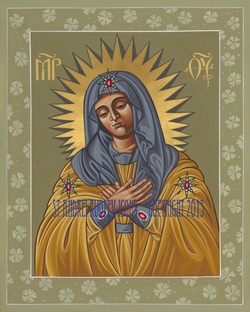 The mysteries in the time between the Annunciation and the Visitation, and the mysteries of the event of the meeting of these two holy women, teach us that we, too, should take the time to reflect deeply before we act, even when it seems obvious what we are to do. There is much to be learned in slowing down a little, listening to what is going on within, letting ourselves savor the joy we feel, and then worshiping as Mary did before she acted upon what she knew she was to do. If we simply go into the act, we will miss the presence of God on a deeper level. We will miss the subtle presence, the gentle voice of the Spirit acting within us. We will miss His words of love, and we will miss the moments of pure wonder and awe at His greatness. The time of planning of the act of service was full of God's presence: who would want to shortchange oneself of that? Yet we do it so often in our prayer. We should allow time in prayer to make room for our response to God's presence. If we are not acknowledging His presence to begin with, there will never be space to simply sit within it, nor to respond. There is much gift and much joy in allowing ourselves to savor His presence. We do not have to anything but sit with Him. When I end my entries here every week with some sort of exhortation to 'meet in the Heart of the Lord,' I mean just that: it is my way of encouraging each of us to remember in whose Heart we really, truly live. If we spend some time there and take the time to enjoy it, we can be like Mary, gaining fuller insight, even if on a level too deep for words, so that it spills outwards. It is in this space that the song of praise in our hearts becomes obvious when we sing it with our love and service of others. May we pray for the gift of quiet reflection in the presence of the Lord! May we have the desire to sit in His presence, moved to joy, wonder and awe! May we look outward in service of others, bringing the joy of our encounter with God to those whom we serve! And may we be open to encountering God through others as well as in our heart! May we continue to meet in the Heart of the Lord with the song of our own Magnificat on our lips! Peace! ©Michele L. Catanese The icons are the work of Fr. William Hart McNichols. The first is Mother of God (After Beato Fra Angelico) and can be found at http://www.fatherbill.org/all-categories/product/171-mother-of-god-after-beato-fra-angelico The second is called Umelenie, Joy of All Joys and it can be found at http://www.fatherbill.org/all-categories/product/280-umelenie-joy-of-all-joys The two photos are mine. The was taken in Arroyo Secco, NM and is really a sunset, but we can pretend it is a sunrise. The second photo is a stand in for the hill country. It is actually in central Sicily in the Province of Palermo. 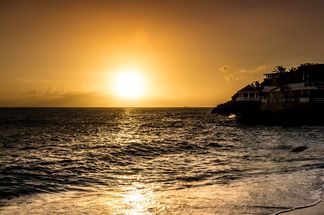 I have always loved the beach. Having grown up on an island, I enjoyed knowing that water was accessible from just about everywhere. I still think the best time to go to the shore is when there are not that many people around, which is often in the off-season. Deserted beaches allow one to have a total sensory experience with the feel of the sand, the smell of the air, the rhythm of the surf pounding on the shore, and the beauty of the sky meeting the water, especially if there is a sunrise or sunset taking place. I have always found the beach to be a spiritual experience because of the luminosity of the sun (or moon) shining on the water. The beauty of nature speaks to me of the presence of God. Just recently I saw a photo (above) which was taken by a professional photographer.* It inspired me to think about the presence of God reflected in nature, especially at the seaside. I thought about why Jesus must have chosen fisherman as His first followers and also why He may have been at the Sea of Galilee so often: maybe the beauty of it captured His heart, too. The shimmering radiance of the sun on the water must have been very moving for Him, just as it is for me. And this radiance must have been what the apostles experienced coming from Him also, since He is one with the Creator of such beauty. Therefore the brightness of His love must have been what captivated those first apostles, motivating them to drop everything to follow Him. Reflecting on the photo of the shimmering sun on the water reminded me of the liturgical season of Easter. This season is a time of special luminosity beginning with the resurrection, which changed everything the apostles thought they knew. They did not recognize the risen Jesus at first because the power of the resurrection had altered His appearance. He was luminous with the glory of God and the love with which He addressed them: “Peace be with you!” The resurrection events culminated with His ascension into Heaven, which we are celebrating next week. The Scriptures are filled with examples of God’s light and the radiance of His presence. For example, God came to Moses through fire in the burning bush. Later Moses had to cover his face after encounters with God because he began to reflect His glory; Moses’ face was said to be too bright for others to look upon. Interestingly, the very first creative act in the Book of Genesis is when God said, “Let there be light.” This is significant: we should realize that we experience Him through light and luminosity. God was anticipating our creation, maybe thinking something like this: “Let them see me all around them. Let me illuminate them as to who I Am.”  Light is important to the identity of Jesus also. Jesus said: “I am the Light of the world.” (John 8:12) He chose to reveal His divinity with light at the Transfiguration. Peter, James, and John saw Him become radiantly, dazzlingly white as He was enveloped in the bright cloud which represented the Holy Spirit. This cloud was God’s protective and luminous presence, referred to as the Shekinah. Therefore it should not surprise us when Jesus resurrected and was filled with the brightness of the glory of God in a new way. Maybe this is why Mary Magdalene did not recognize Him; nor did the two disciples on the road to Emmaus who later said their hearts were burning within them as they spent time with Him. They burned with the brightness of the love reflected by Jesus and then experienced in His Eucharistic presence which He left with them. When it was time for Jesus to ascend, He took the apostles to Bethany. He told them to make disciples of the nations and that they were to baptize in the name of the Father, the Son, and the Holy Spirit. (Matthew 28) He then ascended to the Father on a cloud (Acts 1:18). As they were filled with wonder, two angels appeared who asked them why they were standing there staring at the sky and then pointed out that Jesus had been taken up to Heaven. The angels were basically asking the apostles what they were waiting for. It is as if they are saying “Okay, you saw Him go up to Heaven, now get a move on and do what He told you to do.” The angels were reminding them that instead of simply standing there gaping at the sky, they had a responsibility to take what they had received and to go forth. It is a reminder that whenever we have an encounter with the living God or experience the beautiful, we must not get stuck there. The encounter is not just for us, but it is for us to share. It is to propel us outward in service. This is why artists create: they are sharing what has inspired them with the rest of the world. The apostles understood the message of the angels. They went back to Jerusalem and they created a community of love in which they shared all things in common. They cared for the widow, the orphan, and the stranger in their midst. They shared what they learned from Jesus by baptizing, healing, and forgiving, by bringing the gospel message to far-off lands, and by eventually giving their own lives for Jesus. They did not keep the beauty simply to themselves, but they shared the luminosity of the Ascension with those around them. That is what an authentic religious encounter does: it moves us outward to others in love. When we receive a sacrament, experience God reflected in the beauty of nature or during prayer, we are propelled outward to share that love with others.  The Ascension teaches us that the luminosity of love is not something only for the apostles. When we experience beauty or love we are not to stand there stuck in the moment. While we are meant to experience the wonder and awe of such a moment and to savor it, paradoxically it is best kept in our hearts by sharing it. It elicits a response. Love overflows. By sharing the love of God we are not only keeping it in our memory, but we are keeping it alive by giving birth to it again. In other words, the more we share it, the more beauty becomes part of us. It is the seed of holiness that is fed the light of love when it is shared. Not only do we grow in love, but those around us are affected by it, too. The Ascension teaches us that we savor the light as we share it. We are not to simply enshrine it and stare at it, but we are to allow it to be emblazoned in our minds and hearts so that it becomes a part of us. That fiery, shimmering love gives light and life to those who are lonely, ill, downtrodden, or marginalized. It propels us to love better in all ways: it enhances our relationships and it enables us to love those who may be the most challenging to love. The luminosity of love helps us to forgive and to re-establish long injured relationships, to grow where we are stunted and to help others to do the same. It helps us to love the stranger, the widow, and the orphan, and to bring the gospel to others by simply living the power of our baptismal graces. We will literally shine with the love of Christ, which is why artists depict holy ones with halos. 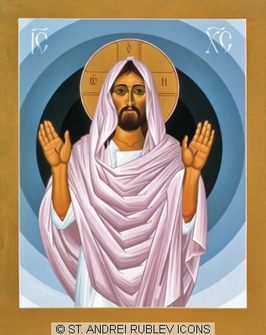 Let us grow through our celebration of the Ascension of Jesus. He has not left us alone. In fact, it is because of the Ascension that He is able to send His Holy Spirit so that we are guided, comforted, and empowered as a community of love. If not for the Ascension we would not have as clear an understanding of how the Trinity works as a relationship of love. St. Augustine wrote aptly that the Trinity is an eternal exchange of love between the Father, Son, and Holy Spirit extended outward to us. We can look up into the sky and see His beauty, but we are also to look outward to share it with others. The Ascension helps us to realize that not even Jesus was to be ‘stuck’ in one moment of glory. He moved forward so that love could come to us through the graces given by the Spirit. We need to take the glory with us as part of us so that we can help others to see the beauty of God’s presence shimmering in creation, and the beauty of his presence lived by His children and shared with them as well. May we have the eyes to see the luminosity of love all around us! May we see God’s presence in beauty and allow it to propel us outwards in love! May we be like the apostles, ready to see God’s presence, but also to allow Him to move us to service! May we be like the first disciples, working to build a community of love in our church! And may we let the luminous, shimmering beauty of the love of Jesus transform our hearts so we may love as He loves! Let us continue to meet in the beauty of the heart of Jesus! Peace! ©Michele L. Catanese *The photographer of all three photos is Joe OHaire, a friend of mine who grew up in the same town as I did. He is a gifted photographer and I think of him as a true artist. The photos are of St. Maartens. I am grateful to have Joe's permission to use them in this blog, since the top photo was my inspiration. But the photos are also copyrighted material, so please do not copy them. Joe has a website in progress so for now you can find more examples of his beautiful photography on his Facebook page at https://www.facebook.com/eriaho The icon is by another friend, Fr. William Hart McNichols and is The Risen Christ. I love this icon because it shows of color radiating outward, like the luminosity of love about which I was writing. It can be found at http://www.standreirublevicons.com/gallery-views/jesus-gallery/product/33-the-risen-christ. (A reminder that his work is also copyrighted.) 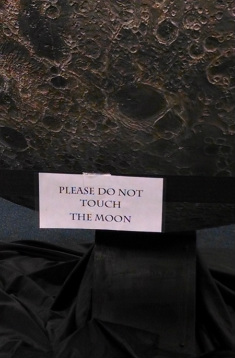 I love the planets, stars, astronomy, planetariums, and all things 'Universe.' I have always been awed by the night sky, which is especially visible when there is no 'light pollution' from a city. For me, gazing at the heavens, be it in pictures or when outdoors, has always been a very moving experience. Because the universe is created by God, it reflects God: mysterious, vast, not able to be fully known, yet knowable. Oh yes... and incredibly beautiful. The cosmos is awe inspiring, and because I feel this way I never miss an opportunity to visit a planetarium if I am in a city that has one. On a recent trip my husband and I ventured into one such planetarium for a very interesting show. In the lobby was a huge model of the moon with the message taped to it, "Please do not touch the moon," (as seen to the left.) I love potentially off-beat or humorous photo-ops so I had to take pictures of the model and its unintentionally ironic message. After a bit of laughter, we moved on and went into the spectacular show about the universe. Since then I have had some more serious thoughts about the implications of the moon model with its sign, and I dare to disagree. Granted, I understand that the planetarium management was speaking solely of their precious model, and rightly so. But if taking this thought to a more symbolic level, I disagree. I say: go ahead, touch the moon! 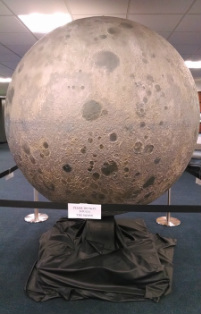 In our spiritual lives we often allow ourselves to be limited in our growth. We want to pray more, we want to do more spiritual reading, and we want to grow in relationship with God. Yet we find all sorts of ways to deny ourselves this growth. Whether it is the mistaken belief that we do not have enough time or that we are not good enough, we have become attached to mediocrity in our relationship with God. Instead of really ‘going for it’ in terms of doing something to help ourselves grow in holiness, we think that it is only for the rarefied few, of which we are not. We think that we are not worthy or that the Lord will ask something far too difficult if we get too close to Him; if we hear His voice in our heart He might ask us something painful or which requires too much work. So instead of reaching for the moon, so to speak, we accept that we would never make it anyhow, so let's not dare try to touch it. The problem is that we have become attached to fear. The fear is that if we try to reach for God, we might fail. I do not think we do this consciously, though in spiritual direction over the years I have heard people say that they are afraid if they get too close to God He will ask them to do something they would really hate to do or something which is too difficult to accomplish. There is really no truth to that idea at all. What God wants most for us is that we have inner freedom. Usually this requires that we do some inner work, such as recognizing and then working to let go of something such as anger, selfish tendencies, the lack of forgiveness, or fear. And it also means growing in the virtues, which again, takes work. But the result of the work is new freedom and new life. Not only that, but God has given each of us unique gifts for our unique purpose. If we don’t let ourselves discover what these are and how to use them, then we are not at all growing into our true selves. God’s desire for us is that we become freer to be the person He made us to be, and therefore to be happier. This brings us closer to Him, and that is really the point of it all. The apostles had to go through this, too. They were fishermen for the most part, ordinary men living ordinary lives in Galilee. But their minds and hearts were open and they were searching for the Messiah. When they found Him, or rather when He found them, He immediately asked them to stretch farther than they may have felt they could. Jesus asked them to leave everything behind and follow Him. No matter how much the Holy Spirit moved their hearts, the apostles still had to dare to follow Him as He invited and on His terms. They had to step out in courage. 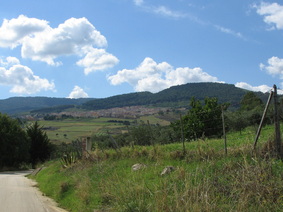 Not long after they took up with Jesus, He told the disciples to go out in groups of two, healing the sick and casting out demons. They must have been a bit frightened. Casting out demons? Healing sick people? Really? Yes, really. They did do it, however, and they returned successful. But had they not dared to listen and trust in Jesus they would never have been able to do it. They had to let go of fears and anxieties, trusting in the gifts they had been given, which included faith, hope, and love. Those gifts empowered them and enabled them to use the gifts of healing they received. They were able to stand up to demons with faith and hope, and to heal the sick with love. It was the power of God within those gifts that enabled the miracles. We, too, can cast out demons and heal the sick. Every time we forgive someone we cast out the demons of unforgiveness, resentment, and hurt. In forgiving we heal the other and we heal our own woundedness. When we help someone who is poor, lonely, elderly or disabled, we are using the gift of healing in some form or fashion. We may not be able to undo their condition, but we heal some of the sense of being forgotten, ostracized, or the message that they are not productive and therefore are without dignity. When we grow in our prayer life by taking the time to simply talk with the Lord and then listen to His voice spoken through our hearts or through people, inspiration, or events each day, miracles also occur within us. We can do things we never thought possible, such as survive a disappointment and grow from it, reach for a goal and make it, learn a new skill at work, change courses in life and find new opportunity, weather the storms of loss, broken promises, illness, and even broken relationships. If the Lord is with us in our journeying, just as with the apostles, we can grow from just about anything, even the most painful of events. The miracle may be in simply getting out of bed and putting one foot in front of the other, one step at a time until we can run again. Echoing St. Paul we, too, can say, “I can do all things in Christ who strengthens me.” (Philippians 4:13) If we do not dare to touch the moon, we will never reach it. If we do not believe the promises of Jesus about new life, we will not attain such life. Jesus said, "I have come so they might have life and have it more abundantly." (John 10:10) He wants us to grow closer to Him. All we have to do is desire it and then try; that is, we have to put the time into it. He promises us that if we put in the effort we will indeed grow in holiness, receiving many gifts along the way, and so come to fuller happiness. As I have said previously, it is not about material wealth, though that is also a gift from God. It is about growing in holiness and joy. It is about letting go of the attachments to fear and negativity which keep us from God. It is about letting go of our attachment to mediocrity in our spiritual lives, which makes us settle for being good, but not reaching for greater heights, which mean experiencing more deeply and abundantly the love of God. It means doing the work of letting God do His work in us so that we may come to know, love, and serve Him better. 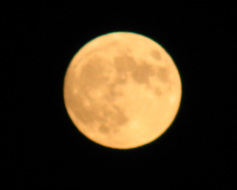 Go ahead: touch the moon. Do not be afraid. Stretch with the Lord and He will let you 'see His face' more clearly. We should never let fear keep us from doing that which others may say we cannot do, such as becoming a saint. We can 'go for it' in our life of prayer and therefore in our Christian virtues. There is no limit to how much we can grow in holiness. And therefore there is no limit to who we can reach out and touch with God at the center. If we hope for it, and trust in God’s love, we can do all things in Him. So please, do touch the moon! May we have the courage to dare to grow in holiness! May we ask for the gift of desire and ability to pray! May we let go of fear and false ideas about prayer and our own worth in order to grow in relationship with the Lord of Love! May we learn to relax and simply be ourselves with God in our prayer! And may we have the faith, hope, and love to reach out and touch the face of God! Let us continue to meet in the Heart of Jesus! Peace! ©Michele L. Catanese All the photos are mine. The first two were taken at the Vanderbilt Planetarium in Centerport, NY. The next photo was taken in Sicily on the way to Contessa Entellina, which is seen in the distance. And the last photo is of course the moon, as seen on a clear night in Baveno on Lago Maggiore in northern Italy. 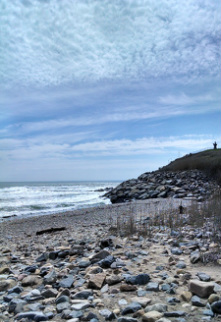 The main character in one of my favorite movies, The Island, is a monk named Anatoly who lives at an Orthodox monastery in Siberia. Apparently he is what is sometimes called a holy fool, a truly holy man who does things which seem bizarre, but which teach lessons.* In one scene the abbot, Fr. Filaret, decides to spend time with Anatoly to learn from him, and therefore he joins Anatoly in the boiler room where Anatoly chooses to sleep. That night Anatoly arises and begins to do all sorts of seemingly mad things: he claims the devil is present and that they are all going to ruin. He closes the flue and begins to stoke the fire, creating smoke that fills the room and so overpowers Fr. Filaret that he is gasping for air. Anatoly yells that he is smoking out the devil. During the chaos he takes Fr. Filaret's boots and throws them in the fire ‘to get rid of the devil.’ Then when they finally escape into the night air, he takes Filaret's prized sleeping mat and throws it into the bay. As they watch it float away, Filaret sits in stunned disbelief until Anatoly indicates to Filaret that he had become too attached to the prestige of having the boots and mat which were gifts from the bishop. He has taught his abbot about the perils of attachment and the freedom found in right usage of the gifts God has given us. While that scene may sound extreme, Anatoly was simply teaching the same message as in the gospels: it is not having 'stuff' that is the problem, but rather it is our attitudes to possessions that can become a stumbling block to us. Anatoly did not randomly choose this lesson. He saw what Filaret was lacking and he offered a very intense way of both pointing it out and removing the attachment. Anatoly explained what he did so that Filaret could see that it was not out of cruelty that he acted. Instead, he was freeing Filaret. It was clear that the lesson was learned and that Filaret was grateful, though still a bit stunned since he had not realized he was so attached. And this is the point: Fr. Filaret did not realize his attachment. We usually do not realize our attachments, either. If we did, we might not be so attached. It is only when the lesson comes to light, when we are tested, that we see (hopefully) that the root of our pain is an inordinate attachment. These can cause us trouble and so we, too, can all stand to learn this lesson from Anatoly. The truth of the matter is that we do place a lot of stock in things that we possess and in ways of doing things that we think are best. And sometimes we even become inordinately attached (in dependency or co-dependency) to people. A way to combat this is to realize all is gift and to develop an ‘attitude of gratitude.’ It is important to pray for the grace of gratitude and also for the grace to be able to see that which causes us to misplace our focus. Because we are human it will be a constant struggle, but it is important to learn. 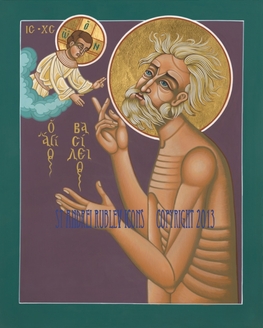 We become attached without realizing it, which is why it is such a shock when it is revealed to us. Even for the least materialistic people, such as the fictional abbot who was living in the most minimal of conditions by choice, we do become attached to something or other. It is simply part of being human. But the wisdom comes when we realize that the attachments keep us from being free. This is not to say we need to become like Anatoly and throw everything in the fire or into the bay. Rather it means we need to recognize that all is gift so that we use and appreciate things the way they are meant to be, but do not define ourselves by them. We should not let our possessions possess us. Our lives should revolve around serving God through loving others, not the 'stuff' we possess or the attitudes to which we hold on. In the Gospel passage about Thomas, (who we unfairly call the Doubter), we see the effects of attachments. After the resurrection Jesus appeared to the apostles while Thomas was not there. (John 20) Thomas said he refused to believe that Jesus had resurrected until he put his hands in the wounds in Jesus’ hands and side. Thomas' problem was not a lack of faith; it was an attachment to his understanding of the way he thought things ought to be. Despite what Jesus had previously taught, he had always believed that when someone died it was final. There was no such thing as being alive again after someone had died. There was no way his friends could be correct in saying that Jesus had come to the upper room while he was away. Yet when Jesus did appear on an occasion when he was there Thomas exclaimed: "My Lord and my God!" That indicates not a lack of faith, but rather that his world had been rocked and he had let go of the attachment to his belief system which was keeping him from this new joy. The same is true of Peter when Jesus came to him on the seashore. (John 21) After Jesus died the apostles seemed confused as to how to proceed, so they reverted to the familiar, which was their old home in Galilee and the occupation of fishing they had before they took up with Jesus. In this passage Jesus had a conversation with Peter in which He asked Peter if he loved Him. There was a lot going on in that conversation, but the most significant is that Jesus was asking Peter if he could let go of his attachments to the way things had been and if he could serve in a new way. Three times Jesus said: "Peter do you love me?" In the original Greek it is clear that He was asking Peter if he can love like Jesus loves. That is: 'Can you give up your attachments to your way of loving? Can you go past loving like a friend loves and love more deeply, the way God loves? Can you give up everything, including your life, to serve me? Can you let go of your attachments to doing things your way and do as I would do?' When Peter finally ‘got it’ he was ready to lead the Church. He understood that much would be asked of him, and so he let go of the fishing in Galilee and eventually even the ministry in Jerusalem so that he could go to Rome and oversee the believers there, giving his life in the end. 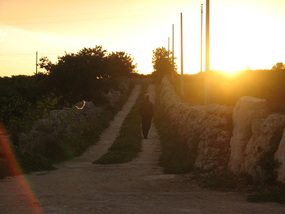 Our attachments are often what lead us to disappointment. Unwittingly we expect something to be a certain way and when it goes another way we get angry and upset. We become disappointed and even can lose faith in someone or something because we are attached to seeing things our way, doing things as we want to do them, and projecting our hopes and desires onto others. The way to deal with this tendency is to learn to trust the Lord when things happen that we do not understand. We need to trust that He is there helping us to get through it, comforting us, and also helping us to adapt to a new reality. We need to recognize that things are for our use. We truly do not possess much at all: everything is gift. Yes, we work hard for what we have and there is nothing at all wrong with having things. But we also need to realize that the things that are most important are those which we do take to Heaven and so we should put our ‘stock’ there. What we will take into the hereafter is the wisdom, grace, and virtue we grew into in this life, the loving deeds done, the love we had for people, the acceptance of grace given, and the graciousness with which we lived. We will take the essence of who we are and the beauty of its imprint upon others. We will take our memories, will, and understanding, our faith in His mercy and love, wrapped in our own love and desire to be with God forever. We leave the material behind, knowing it is for someone else to use for a while. In the meantime, we need to realize that the best way to deal with the ‘twists and turns’ in life is to ask ourselves: “In the light of eternity, how important is this issue or thing?" If something seems to be taken from us unfairly, we need to ask for the grace to see that it was not ours to start with or that there is a reason for us to not have whatever it was any more. There may be a lesson in attachments somewhere inside the experience. When we are less attached, we are freer, and when we are freer, we are happier. May we have the courage to ask for our attachments to be revealed to us so that we can make right use of them and not be possessed by them! May we have the realization that everything is gift! May we have the grace of gratitude for the many gifts given us! And may we be open to new ways of doing things and sharing things with the freedom to be as we were meant to be as God’s sons and daughters! Let us continue to meet in the Heart of the Lord in freedom! Peace! ©Michele L. Catanese *The Holy Fool or yurodivy is the Russian version of foolishness for Christ, a peculiar form of Eastern Orthodox asceticism. The yurodivy is a Holy Fool, one who acts intentionally foolish in the eyes of men. The term implies behaviour "which is caused neither by mistake nor by feeble-mindedness, but is deliberate, irritating, even provocative." Ivanov, S. A. (2006) Holy Fools in Byzantium and Beyond. Oxford: Oxford University Press. The photos are mine. The top one was taken at Montauk Point, LI. The bottom photo was taken outside of Noto, Sicily while staying at a farm house. The icon is St. Vasily the Holy Fool by Fr. William Hart McNichols. It can be found at http://www.fatherbill.org/all-categories/product/314-st-vasily-the-holy-fool 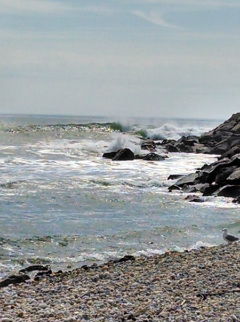 This past week was a time of sojourning for me. I traveled to the area where I grew up and spent a week there. The trip was not for pleasure necessarily, but for a funeral. As in all Christian funerals it was both a time of the sorrow through loss and a time of joy in the resurrection of the body to come. After the Mass was over and the last notes of Taps faded (the burial included military honors), and the final "amen" was spoken, it became clear to me that while my father's sojourn had ended, mine was simply changing. All journeys have their twists and turns and all things in this life continue to shift and change. I could see that the presence of God was no less visible in the beautiful blossoms of springtime than in the breaking of the bread which we had experienced just minutes earlier in the Church. All it takes is the eyes of faith to see and the ears of belief to hear that, in fact, Jesus Christ has risen and has conquered death. During the rest of the week, especially in the time we spent going to places I had not been in years, the echo of "Alleluia! He has risen!" continued to resound. This recognition was enabled because of the breaking of bread and the community of believers who were partaking in it joined in faith and hope in the gift given us by Jesus before He died. Although the focus in this Sunday’s liturgy is on the two disciples on the road to Emmaus, it is the second reading which grabbed my attention. The author said: "...Conduct yourselves with reverence during the time of your sojourning, realizing that you were ransomed from your futile conduct, handed on by your ancestors, not with perishable things like silver or gold but with the precious blood of Christ as of a spotless unblemished lamb." (1Peter1:17-19) Jesus gave his Body and Blood to us as ransom for our sins and in doing so He gave us life imperishable. Jesus has gifted us with all that we need to traverse this life, with its many ups and downs. He made the perfect offering for us so that we might live in the joy of knowing that nothing we do can separate us from Him. He paid the price so that we could have everlasting life. 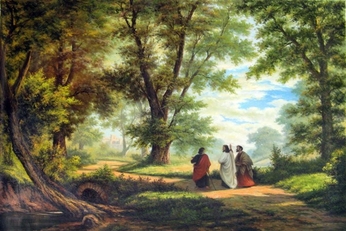 As Peter said in his letter, we ought to conduct ourselves with reverence because like the two disciples on the road to Emmaus, we are not alone. Jesus accompanies us no matter where we are. He comes with us and He is readily accessible at all times. However, just as the two disciples failed to recognize Him we, too, often fail to recognize Him. He is with us when we are with strangers in all sorts of places, such as in a restaurant or supermarket, in an airport, or walking in the street. He is with us as we go to a beautiful seashore or park, or as we sit in our own back yards "contemplating" our garden. The presence of God is all around us in each and every encounter and therefore we need to conduct ourselves reverently, remembering that we are in His presence. The challenge, of course, is when we are not in a pleasant encounter or when we are in a time of suffering. It is easy to see Jesus in the beauty of nature or in a peaceful setting, but when we are in a time of trial or suffering it is much more of a challenge to recognize that He is among us. Just as the two disciples on the road were bemoaning that the man whom they thought was “the One” had died and therefore must not have been "the One," we should not make the mistake of thinking that He is absent from us in the midst of a dark time. He is with us whether we are aware or not, just as with the two disciples. He continually reveals Himself, but we need to open our eyes and ears to Him. And likewise we need not return to the empty tomb over and again to see if He really is not there. We must trust that what we have seen and heard is real. The truth is that Jesus is not there, but rather He walks by our sides fulfilling promises He made long ago that He would remain with us. Easter is a joyous time, but it does not mean we should deny that we have many burdens to carry and many challenges to face. Christ is just as raised for us during our times of suffering as He is for us in times of joy; and we are just as loved when we are facing a difficult situation as when we are in a time of celebration. The circumstances of our lives do not change the reality that Jesus Christ has risen and that He loves us way beyond anything we can image or understand. But what He offers us that make all the difference is the strength we receive from the Eucharist. He left us His Body and Blood so that we would have access to His direct presence at all times. He left us the sacraments so that we could have safer passage through the snares of sin and the temptations to which we sometimes fall prey. And He also left us His Body, that is, His Church, the community of believers which supports us and helps us to circumnavigate through the rough waters of life. Just because He has risen our lives do not automatically get easier. In fact, for the early Christians their lives became even more challenging as they tried to bring the same message abroad that got Jesus killed in the first place. In the beginning of the Acts of the Apostles (chapter 2) Peter stood up and proclaimed to the crowds that Jesus was indeed the Son of God who had come to redeem us. While many came to believe, we see that just a few days after this he and John were arrested for preaching the gospel and healing someone in Jesus’ name. They had to trust in the presence of Jesus with them as they brought His message to others: they were definitely not alone. Just as with the apostles, we do not go it alone either. Because we have the Body of Christ to partake of in the Eucharist, His presence continues to move among us and through us to others. We have the strength to persevere when times are difficult. We also have the courage to act with reverence, bringing the same love which He offers to us to those around us. We make His presence known by our acts of love given to the people we encounter day to day. For some, our actions will be the only 'Acts of the Apostles' they ever read. 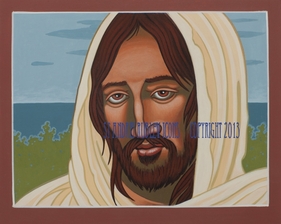 If we allow ourselves to see Jesus by faith and experience Him through love, we can be like the two disciples, who upon arriving in Emmaus invited the stranger to dine with them, only to discover that the stranger was actually Jesus fully present through love. We can be like those disciples feeling our hearts burn within us because we are in the presence of Christ. He is present in the Eucharist, but that presence will stay in the tabernacle, so to speak, if we do not take Him along with us on our sojourn in order to be comforted, strengthened, and empowered by Him and to bring Him outwards to others by our acts of kindness, compassion, mercy, and love. Let us be like the two disciples on the road who rushed back to Jerusalem to tell the others what we have experienced, filled with the joy of recognition. Let us share what we have received as we become what we eat: Eucharistic presence for those whom we meet. Let us live our lives in the joyful hope of knowing He is with us and His love is everlasting. No matter what we have done, how low we may have fallen, how small or weak we think we are, let us remember that He died and rose for us because He loves us. We do not have to earn it nor do we have to be “good enough” for it: it is freely given in love for us. May we have the eyes to see and the ears to hear the Good News that Jesus is present in the bread broken and shared! May we be like the disciples on the road to Emmaus who welcomed Jesus and then ran to share the Good News with their friends! May we become the bread broken and blessed for others, sharing the love of Christ by our actions! And may we accept the gift of His presence with us on our sojourn, allowing Jesus to guide us home to Heaven! Let us continue to meet in the Eucharist! Peace! ©Michele L. Catanese I took the top photo at Montauk Point, Long Island during my sojourn this week. The painting is The Road to Emmaus by Robert Zund. The icon is The Galilean Jesus by Fr. William Hart McNichols and can be found at http://www.standreirublevicons.com/gallery-views/jesus-gallery/product/293-the-galilean-jesus |
Heart Speaks to Heart
|

 RSS Feed
RSS Feed

